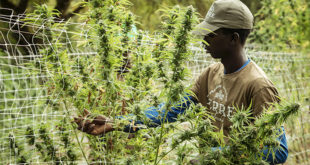
Illinois state law has decriminalized possession of small amounts of marijuana for personal use. However, many local municipalities are adopting their own rules. In 2016, a bill was signed into law that decriminalized possession of 10-rams or less of marijuana. The fine ranges from $100 to $200 depending on the offense.
The legislation, as written, allows local governments to adopt their own rules regarding marijuana and associated fines, according to Tribune Star. When decriminalization took effect, roughly 200 small municipalities had individual ordinances. Dozens of other small communities have adopted local provisions as well. Depending on the city that you live in, you may see a fine as small as $50 or as large as $1,000.
If you possess marijuana in Carbondale, you’ll receive a $125 fine and must perform 25-hours of community service. Chicago is a bit different. In 2012, it set the limit of possession to 15-grams and an attached fine ranging from $250 to $500.
Marshall will follow the state’s standards, allowing possession of up to 10-grams of marijuana and a fine of $100 to $200.
Marshall Mayor Camie Sanders said, “We presented a fair ordinance. We need to recoup a little of our costs when these things happen, when you have to pull them over, and I don’t think it’s something that’s going to impact the family. Our fines aren’t high enough that it’s going to cause a lot of grief.”
City of Paris officials passed an ordinance in October 2016 that allows possession of up to 100 grams with a fine between $100 and $500. Now, if you are caught with more than 100 grams of marijuana in Paris, Illinois, you will be charged with a felony.
Local ordinances have also been adopted in Hutsonville, Robinson and Palestine. The fines range from $250 to $750 if you possess 10-grams or less.
State Rep. Kelly Cassidy said, ‘The biggest thing we wanted to get rid of was the patchwork where you could get arrested or not. We wanted to take that part away. That was critically important. Some (communities) are seeing this as an opportunity to get the revenue instead of giving it to the state, and that’s fine, too.”
 Illinois Marijuana Info IL Marijuana Info | Marijuana Info IL
Illinois Marijuana Info IL Marijuana Info | Marijuana Info IL





